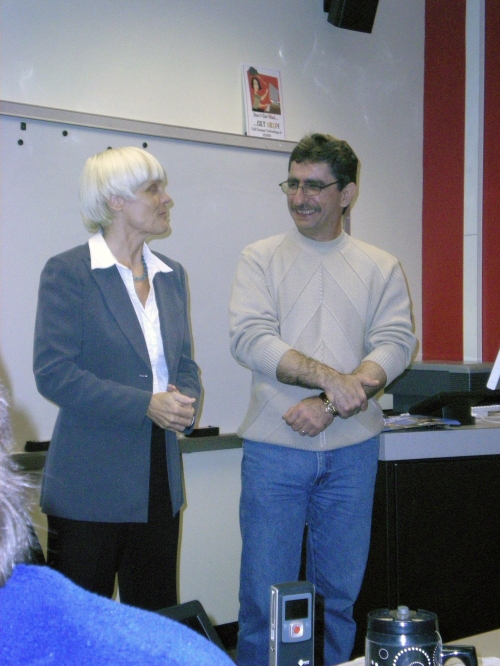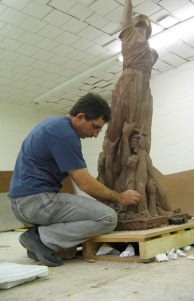As a working journalist in war-torn Iraq, Ahmed Fadaam knows the power of his profession. On Wednesday, Fadaam shared this insight as well as his experiences in Iraq to a room full of future journalists.
“Since I consider myself anti-war, I don’t like war, I don’t like to have my country at war, then I should do something,” said Fadaam. “And when you want to fight back its not necessary to do it with a weapon. You can do it with words, with bringing in facts, with telling the world about what they are missing.”

Elon Professor, Janna Anderson, introduces Ahmed Fadaam to her reporting class.
Fadaam, who has a Ph. D in Fine Arts, once taught sculpture for the University of Baghdad. Things changed dramatically for Fadaam in 2003 during the U.S. invasion of Iraq. Life since, has been anything but normal.
“Lots of government buildings were burned or destroyed, including the art school, so at the time I had to find me another job,” said Fadaam.
His new job, working as a translator for NPR’s “The Connection” with Dick Gordon, launched Fadaam’s career in journalism. Fadaam found the courage to stay and make his life of value by reporting.
“When the bombings started my wife insisted we should leave Baghdad to find a safer haven for ourselves and the children and I refused and told her that when my children would grow up they would need to know what happened and I didn’t want them to hear about it from someone else, I wanted them to hear about it from me and to be a first hand witnesses,” said Fadaam. “So I decided to stay in the city and know as much as I could about what was going on, until suddenly I found myself working as a journalist.”
Fadaam went on to work for the Agence France Presse and the Baghdad Bureau of the New York Times. As the situation in Iraq deteriorated, Fadaam was forced to confront the reality in Baghdad from two perspectives, as a working journalist in Iraq and as a citizen of Baghdad.
In 2006, Fadaam made the difficult decision to temporarily move his family to Syria.
“You couldn’t even feel safe in your house because of the exchanged shelling between neighborhoods. It’s like you are sitting in your living room and suddenly you start hearing sounds of explosions and bits of mortar shower against your neighborhood. That’s why I moved my family out, at least to send my children to school,” said Fadaam.
When the security situation improved in Iraq, Fadaam moved his family back. But as Fadaam found himself facing a different threat, he was forced to move his family back to Syria where they reside today. Some Iraqis saw Fadaam as a traitor for working for western media.
“After receiving a death threat which included kidnapping one of my children or killing my wife I had decided to send them back again. And they are in Syria right now waiting for me,” said Fadaam, “so it’s not an easy job being a journalist in Iraq.”
Last April, Fadaam left Iraq for the United States to work for Dick Gordon’s “The Story”. Fadaam publishes a series called Ahmed’s Diary, which has won 5 major awards. For Fadaam, it is work that opens the dialogue between Iraqis and Americans.
“There is no American in Iraq explaining to the Iraqis that there are Americans who oppose the war and want to live a normal life away from violence. But there is an Iraqi here in the United States who is trying to do this,” said Fadaam.
It is the latest chapter in his career of providing valuable insight for a volatile situation.

Ahmed works at his other profession, creating a sculpture for Elon University. Photo courtesy of Tom Arcaro.
